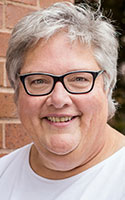Neighborhood Center executive director (and co-founder) talks about the groups’ mission, challenges.
By Mike Costanza

St. Joseph’s Neighborhood Center provides medical care, mental health counseling, social services and many other forms of assistance for a huge number of people each year.
No one is turned away due to lack of insurance, an inability to pay for a service or the place in which they live. The nonprofit, which is located on South Avenue in Rochester, has only 20 people on its payroll, and a budget of just less than $1.7 million.
In Good Health spoke to Sister Christine Wagner, the Neighborhood Center’s executive director, about its role in local health care and the challenges it faces. Wagner was one of the five nuns of the Sisters of St. Joseph of Rochester, a Catholic order, who founded the nonprofit in 1993.
Q. What’s the mission of St. Joseph’s Neighborhood Center?
A. The mission of the center is to provide high quality comprehensive integrated care to those who don’t have access to adequate insurance coverage in an equitable manner and environment.
Q. Are you part of the Sisters of St. Joseph of Rochester?
A. We’re really rooted in the service traditions of the Sisters of St. Joseph, but we’re separately incorporated and have been since 2012. We are unaffiliated with the diocese.
Q. The Neighborhood Center has about 1,400 patients or clients on its roster. What kind of people does it serve?
A. We have the capacity to serve from birth to senior, but most of our patients are 30 to 65 years old. They are uninsured for the most part. I would say 75% are working, but either make too much to be eligible for a public insurance product on the New York state marketplace or Medicaid, or can’t afford to buy their own product. So they fall in an uninsured category.
Q. They don’t have to satisfy income requirements?
A. We do an income assessment and we apply a sliding scale. That’s $0 to $50. For the most part the co-pays fall within the $0 to $20 range. Geography also plays no part in what we do. We have people that come as far away as Buffalo, Binghamton, Syracuse because they can’t find the services that they need where they live.
Q. Would you tell the readers what types of care or other assistance the Neighborhood Center provides?
A. We have full primary (medical) care. Patients see their own physicians consistently. We have dental services, both restorative and preventive and have full mental health services, including psychiatry. We also have sub-specialty care right on site, specialists who come in to see patients.
Q. Your nonprofit’s budget is quite small. How can it afford to offer specialized care?
A. We’ve been very successful in getting volunteers—professionals—who come in on a periodic basis and see the folks that need consults. Cardiology, pulmonology, neurology, dermatology, orthopedics, if it can’t be rendered onsite at the Neighborhood Center, we’ll find a place. It might be like the ortho clinic at Strong (Memorial Hospital) or a dermatology office that’s offsite.
Q. How many volunteers give their time to the Neighborhood Center?
A. Between 400 and 500. If I were to break that down, it would be about 100 licensed professionals who volunteer their time. We also have a lot of students we number in our volunteers.
Q. You mentioned that St. Joseph’s provides social services. Can you tell us the kinds of assistance you offer?
A. We have a full range of social services which attend to the social determinants of health for our patients and clients. If we see they’re eligible for medical insurance, we help them apply. We can certify people for SNAP (Supplemental Nutrition Assistance Program) benefits through the county. We can also give referrals for food, clothing, housing and legal services. Whatever is a burden or troublesome for people, we’re able to either give them a service or give them a trusted referral to another agency.
Q. In addition to taking care of its regular patients, the Neighborhood Center provides minimal services to as many as 2,600 more each year. What does it do for them?
A. We make a lot of exceptions beyond who our regular enrolled patients are. We do a lot of work physicals, school physicals, certifications, that kind of thing. Somebody might visit the area, and need to be seen.
Q. The Neighborhood Center doesn’t receive reimbursements from insurance companies. How do you finance your services?
A. A full 80% to 90% of our income is from community donations. It could be from individuals, from grants, and we have one or two fundraisers a year.
Q. The Neighborhood Center remained open for all but a few days during the pandemic lockdown. How did you take care of patients who couldn’t visit in person?
A. We made several rounds of calls to all our patients. At first, it was to assure people that we were there. That we couldn’t open yet, but they should just call us with whatever they needed. At that point, the biggest need was for food, and we were able to direct people to emergency food sources. As time went by, people were running out of their medications, so we got them their medications. Then we started seeing people on site, but with very strict protocols for the safety of the staff and the patients. Now, were seeing patients regularly in every department.
Q. What challenges does the Neighborhood Center face in the coming years?
A. We, for 20-some years now, have relied on hand-to-mouth. During the pandemic, we were given many times the largest donation that we have ever had from a longtime benefactor. That’s going to be the basis or foundation of building some cushion that we can invest. Our board is in a position right now to take a more substantive look at sustainable financing. We’re also quite frustrated with the number of people that are still uninsured or without appropriate care who don’t know about us. We are just finishing a strategic plan that has three themes. One of them is greater outreach into the community. It’s going to be a multifaceted approach.
For more information on St. Joseph’s Neighborhood Center, or to make a donation to the nonprofit, go to: https://www.sjncenter.org

